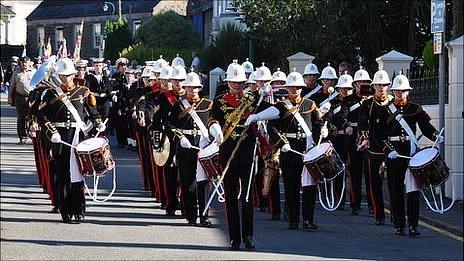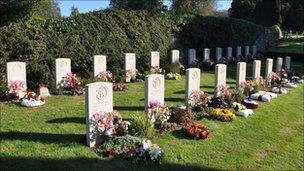HMS Limbourne survivor thanks Guernsey
- Published

The Royal Marine band played a concert and led the parade in remembrance of the losses suffered 68 years earlier
A survivor of a British naval disaster in World War Two has paid tribute to Guernsey's remembrance of his shipmates.
More than 500 men died when HMS Charybdis and HMS Limbourne were sunk on 23 October 1943.
Their bodies washed ashore in German-occupied Guernsey, Jersey and France.
Neil Wood, a radar operator on HMS Limbourne, said the turnout of the islanders at the military funeral of the sailors and marines had been a great show of support for the Royal Navy.
In all 5,000 Guernsey people attended the funerals of the 21 servicemen washed up on the island, laying a total of 900 wreaths.
Following this public demonstration of support for the British Armed Forces the German authorities banned the public from attending the funerals of an additional 29 sailors and marines washed ashore in Guernsey and all the funerals of those found in Jersey and along the French coast.
Mr Wood, who at 87 is one of eight living survivors, said: "Islanders showed their commitment to honouring the boys... the Guernsey people recognised the service our lads gave and they've kept up the memorial service."
The remembrance events, held at the weekend, included wreath laying at sea, a dinner, a concert by a band of the Royal Marines and a parade and remembrance service at the Foulon cemetery where some of those who washed ashore were buried.
Captain Peter Voute, the President of the Guernsey Association of the Royal Navy and Royal Marines, said the weekend may slim down in 2013.
He said there was a question over how long survivors would continue to attend the weekend.
Captain Voute said: "Probably the weekend will change on the 70th anniversary... and there will be just a memorial service at the Foulon."
Neil Wood, who has visited the island for the memorial service for the majority of the past 28 years, had served aboard HMS Limbourne since she was commissioned in 1942.
After service in the Mediterranean and Atlantic, the vessel was assigned to Portsmouth to operate along the French coast and around the Channel Islands.
'Still at war'
The disaster struck on Operation Tunnel when, due to errors made ashore and afloat, the British task force was outmanoeuvred by a smaller but better trained enemy force.

Flowers were laid by island groups and dignitaries during the service at the Foulon
The vessels were hunting for a German convoy when HMS Charybdis was hit by a salvo of six torpedoes fired from a German cruiser.
Another torpedo tore into the vessel before it sank with just 107 of its 570-strong crew rescued.
Just before the seventh explosive hit, a torpedo struck HMS Limbourne's forward magazine resulting in the death of 40 crew members, a third of her crew.
She remained afloat but after a failure to attach a tow to the vessel she was scuttled by to keep her out of enemy hands.
The incident was used as an illustration of what not to do by the Royal Navy tactical school.
Mr Wood said looking back 68 years made him question if the sacrifices made had been worth it.
He said: "All the things that happened during that time, not just the Charybdis and Limbourne, but the many, many other very sad stories that can be told.
"What benefits have we had from that? We've still got lads and lasses fighting abroad somewhere so sometimes I wonder what was it all about because we're still at war."
- Published3 October 2010
- Published30 September 2010